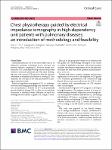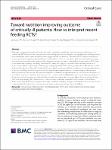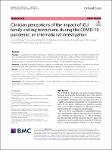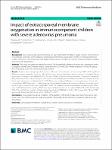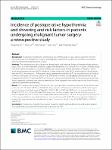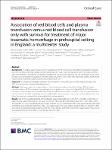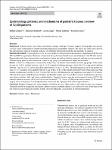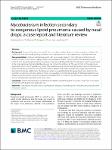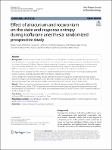Search
Author
- Daqing, Ma (3)
- Alexis, Ferré (2)
- Anna, Lybeck (2)
- Ashish K., Khanna (2)
- next >
Subject
- intensive care unit (8)
- acute respiratory dist... (5)
- chronic obstructive pu... (5)
- ICU (5)
- next >
Date issued
Has File(s)
Search Results
Chest physiotherapy (CPT) has been widely used as an adjunctive treatment to facilitate airway clearance and promote effective coughing [1]. Previous studies indicated that CPT could improve lung function and prevent ventilator-associated pneumonia [2]. One main challenging issue with current CPT practice is that the objective assessment of ventilation distribution is missing [3]. Consequently, the CPT plan is not fully personalized according to individual needs. |
Toward nutrition improving outcome of critically ill patients: How to interpret recent feeding RCTs? Although numerous observational studies associated underfeeding with poor outcome, recent randomized controlled trials (RCTs) have shown that early full nutritional support does not benefit critically ill patients and may induce dose-dependent harm. Some researchers have suggested that the absence of benefit in RCTs may be attributed to overrepresentation of patients deemed at low nutritional risk, or to a too low amino acid versus non-protein energy dose in the nutritional formula. |
To guarantee the safety of the public, clinicians and patients during the COVID-19 pandemic, hospital visits were severely restricted internationally. There are limited data on the precise impact of these visiting restrictions on Intensive Care Unit clinicians. Our objectives therefore were to explore the impact of family visitation restrictions on clinicians and care delivery and describe innovation alongside areas for potential improvement. |
Severe adenovirus (Adv.) pneumonia can cause significant mortality in young children. There has been no worldwide consensus on the impact of extracorporeal membrane oxygenation (ECMO) in immunocompetent children with severe Adv. pneumonia. This study aimed to assess the impact of ECMO in immunocompetent children with severe Adv. pneumonia. |
Perioperative hypothermia and shivering are common and can cause adverse outcomes. The aim of this study was to investigate the incidence of postoperative hypothermia and shivering and their risk factors in patients undergoing malignant tumor surgery. |
In-hospital acute resuscitation in trauma has evolved toward early and balanced transfusion resuscitation with red blood cells (RBC) and plasma being transfused in equal ratios. Being able to deliver this ratio in prehospital environments is a challenge. A combined component, like leukocyte-depleted red cell and plasma (RCP), could facilitate early prehospital resuscitation with RBC and plasma, while at the same time improving logistics for the team. However, there is limited evidence on the clinical benefits of RCP. |
Pediatric traumas are common and remain a unique challenge for trauma surgeons. Demographic data provide a crucial source of information to better understand mechanisms and patterns of injury. The aim of this study was to provide this information to improve treatment strategies of potentially preventable morbidity and mortality in children. |
Vasopressors and fluids are the cornerstones for the treatment of shock. The current international guidelines on shock recommend norepinephrine as the first-line vasopressor and vasopressin as the second-line vasopressor. In clinical practice, due to drug availability, local practice variations, special settings, and ongoing research, several alternative vasoconstrictors and adjuncts are used in the absence of precise equivalent doses. Norepinephrine equivalence (NEE) is frequently used in clinical trials to overcome this heterogeneity and describe vasopressor support in a standardized manner. |
Exogenous lipoid pneumonia (ELP) is a rare disease and its diagnosis is often mistaken or delayed. Secondary infection with rapidly growing non-tuberculous mycobacteria is a rare complication of lipoid pneumonia. |
Several researches have examined the impact of inhalation anesthetics, intravenous anesthetics, and muscle relaxants on spectral entropy, but many did not evaluate the extent of neuromuscular block. Besides, they did not inspect the impact of distinct degrees of neuromuscular blockade on spectral entropy under dissimilar saturations of isoflurane inhalation. Hence, this study has evaluated variant degrees of minimum alveolar concentration (MAC) to estimate the isoflurane concentration, along with various levels of neuromuscular blockade. |

